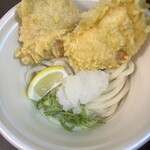
はなまるうどん 中野通り店
Hanamaruudon
3.16
Nakano
「Udon」
--
--
Opening hours: 7:30 - 23:00 Open Sundays
Rest time: None Opening hours and holidays are subject to change, so please check with the store before visiting.
東京都中野区中野5-67-6 ビジネスハイツ中野B1F
Photos
(20)
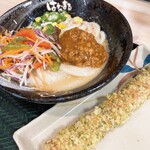

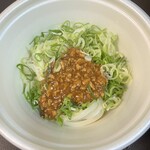
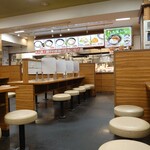
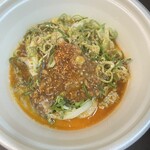
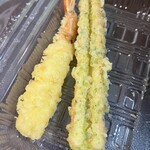
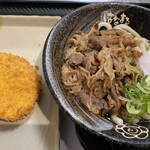
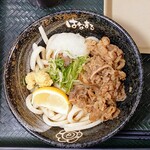
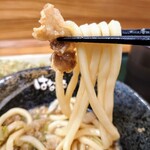
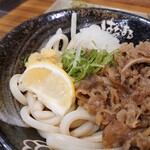
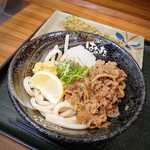
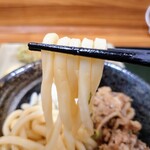
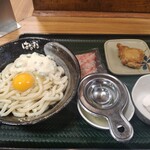
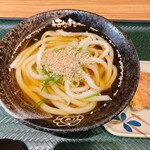
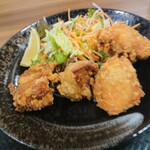
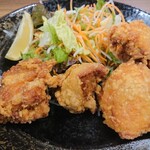
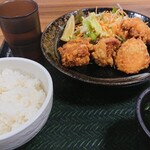
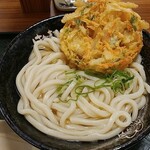
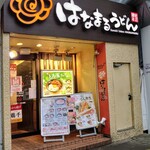
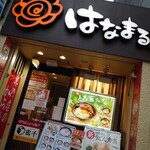
Details
Reservation Info
No Reservations
Children
child-friendly
Payment Method
Credit cards accepted
Electronic Money Accepted
Private Dining Rooms
None
Smoking and Non-Smoking
No smoking at the table
Parking
None
Nearby toll parking: Nakano Broadway (35 cars), Nakano Sun Plaza (99 cars), etc.
Comments
(20)
ペディグリーチャム夫
3.00
After a chain store drinking party near Nakano Station, I wanted to grab something to eat. Personally, I don't eat chain store udon often, maybe once every five years? It doesn't seem very delicious. But it was delicious!! I was surprised!! I recently went to a highly rated Sanuki udon store in Kagawa Prefecture, but I feel like the noodles here are actually tastier. In conclusion, chain store udon is surprisingly delicious!

月姫パパ
3.00
I had curry udon with beef topping and rice. It was delicious!! After finishing the udon, I poured the leftover curry over the rice to make a curry rice bowl. It was so good!! I can't resist it!! It was a perfect order. Next, I'm thinking of getting kama-tama. I would be happy if they had mentaiko as a topping. I hope it will be a new addition to the toppings! That's all for today.
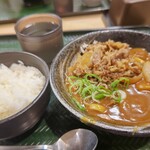
月姫パパ
3.00
I come to this restaurant for food quite often. I usually don't take photos or write reviews, but today I took a rare photo, so I thought I'd write a review. Today, I had the Beef Onsen Tamago Bukkake (small) for ¥590 and the Curry Rice (small) set for ¥350. The Bukkake was flavorful and the udon noodles were softer than usual, which was a bit disappointing for someone who prefers firmer noodles. However, it was still delicious. The Curry Rice was my first time trying it and I thought it was tasty considering the price. It left me feeling satisfied and full. I will definitely come back to eat here again.
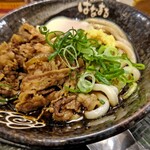
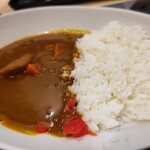
あっとらんこ
3.20
It's been a while since I had Hanamaru Udon. I ordered a small kake udon for 270 yen (tax included), chikuwa tempura for 110 yen, inari for 110 yen, oden with beef tendon for 160 yen, a boiled egg for 100 yen, and a big frank for 160 yen, totaling 910 yen! I think I ate a bit too much. The oden is delicious, but I could have been fine with either the beef tendon or the big frank. It's dangerous to order quickly when there's a line behind you, especially with tempura. Also, about the kake udon. Wasn't the small size around 130 yen in the past? It was nice because you could order many options with the lower price. I don't really agree with paying 270 yen for Hanamaru Udon, as I don't find it as tasty as Marugame Seimen. The restaurant is located underground, but it's surprisingly spacious and clean. The staff are mostly older ladies who greet you warmly, which makes the atmosphere pleasant. You need to be careful not to over-order, but if you choose wisely, you can have a lunch for around 700 yen, so I would like to visit again to have oden before it gets warmer.
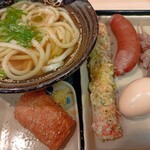
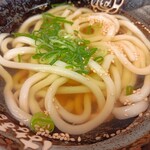
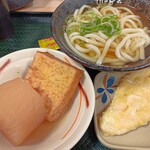
たてっちゃん
4.00
This time, I visited "Hanamaru Udon Nakano-dori Store"! I ordered the Beef Warm Tamago Bukkake Udon for 720 yen, with additional toppings of seaweed for 80 yen, grated yam for 120 yen, shrimp tempura for 150 yen, and chikuwa isobeage for 110 yen, totaling 1180 yen! It's about a 4-minute walk from Nakano Station North Exit. You can also access it from Sun Road, but it can be a bit confusing to find the entrance, so it's easier to turn left just before Sun Road and go straight along Nakano Street. The interior has a counter and table seating. You choose your favorite menu, select toppings like tempura yourself, and then pay at the counter. It's mostly self-service. It can get crowded during lunchtime with families, but the boiling time is not long, so the turnover is fast. The prices are quite affordable. There are plenty of toppings available, so you can customize your udon to your liking! The taste was consistently good!
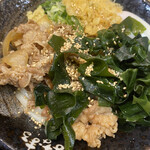
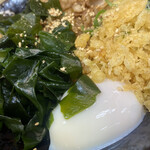
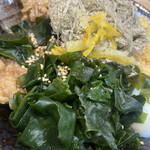
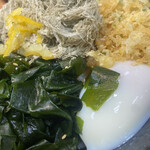
すーぱー彦左衛門
3.00
I used a 50 yen discount coupon on the app at the Hanamaru Udon Nakano-dori store, a 4-minute walk from Nakano Station North Exit in Tokyo, and ordered the rich seafood pork bone dipping noodles with chikuwa tempura and daikon oden toppings for 850 yen. I usually prefer Marugame Seimen, but I was drawn to the dipping noodles fair sign at Hanamaru's storefront. I arrived at 1:30 pm and the restaurant was about 50% full. I saw the customer in front of me taking daikon oden, so I decided to order it as well. I also ordered the chikuwa tempura, and while the dipping sauce was warm, I chose to have the noodles cold as you could choose between warm and cold noodles. Since the price was the same for small or medium noodles, I naturally chose the medium size. I received my udon shortly after ordering, paid, and sat down. The dipping sauce was watery and had a strong seafood flavor, with no hint of pork bone flavor. The richness mentioned must have referred to the strong seafood flavor. Unfortunately, the dipping sauce was lukewarm, and the noodles cooled quickly because I chose them cold. The supposed chashu on top of the noodles had a rich taste due to the sauce. However, the daikon oden was delicious. Thank you for the meal!
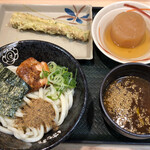
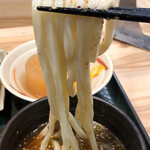
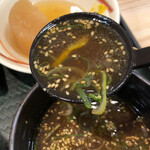
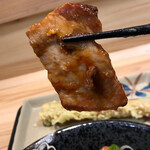
kumori12
3.00
It's been a while since I last visited. When I came back, I noticed that the tables inside the restaurant had been rearranged beautifully. Due to COVID-19 measures, partitions were placed on all tables, but there were so many that it was quite difficult to place my tray with udon on the table. The udon and croquettes were delicious as always.

yutak829
3.00
Udon Exploration Chain Store Criteria Search Edition
There have been several udon booms, with a fervor for udon tasting in the 90s and the 2006 movie "UDON" leading the trend nationwide, popularizing chain stores such as Marugame Seimen and Hanamaru Udon that play a role in promoting Sanuki udon. Hanamaru Udon, founded in 2000 as a food and beverage division of an apparel company in Takamatsu City, Kagawa Prefecture, started the trend, while Marugame Seimen also emerged in the same year, focusing on creating a pop and female-friendly store concept inspired by the udon boom. The founding store, Kita store, still exists and proudly displays the original signage from its establishment, emphasizing its birthplace. Marugame Seimen expanded its stores earlier, opening its first store outside Kagawa in Kurashiki in 2002 and starting a franchise business the same year, marking the beginning of its rapid growth story. By 2003, it was moving towards multiple stores, operating a factory in Chiba to reach 50 stores and establishing a solid base with its Tokyo headquarters. In August of the same year, it exceeded 100 stores and surpassed 150 stores in December. It expanded its stores earlier than Marugame Seimen, becoming part of a major corporation. In 2004, it formed a business alliance with Yoshinoya T&C and moved its registered head office from Takamatsu to Ginza. In 2006, it became a subsidiary of Yoshinoya. Since 2006, it has introduced a udon season ticket, offering a 100 yen discount every day for one month for 500 yen. In 2018, it collaborated with Yoshinoya and Gust, and by 2020, it had exceeded 500 stores, although there is a significant difference between Marugame Seimen, which has over 1,000 stores in 47 prefectures since 2011. The two companies are often compared as they aim to become chain stores, each having different attitudes stemming from their origins, with notable differences in their approach to customer demographics. Customers who did not receive Hanamaru in their childhood express a desire to receive it, and the origin of the name Hanamaru is intriguing. The company produces fresh noodles in its own factory, incorporating food fiber equivalent to one lettuce per serving, showing consideration for health, such as transitioning to fiber-rich noodles. Although it is authentic, it also considers individuality and dietary lifestyles, making customers happy. Udon is ordered last in the Kagawa-style self-service system, similar to Marugame Seimen, but with a slight difference in the order of ordering udon, choosing from large, medium, or small portions, deciding between cold or hot, setting the menu, ordering at the cash register, waiting for a while for it to arrive, receiving the udon, paying, and then garnishing it with condiments like green onions according to your preference before enjoying it. The gentle, freshly made udon has a clear, bright broth that is not fishy but has a gentle, soft umami flavor. The udon noodles are smooth, light, with a good bite, and have a slight elasticity, using wheat from Australia with a focus on health with added food fiber. The broth is made from Seto Inland Sea dried fish, combining Umami and mackerel with Kagawa soy sauce for a mild taste without strong flavors. Accepting new values with a flexible mindset unique to the group, it conveys the deliciousness of udon, showcasing the unique charm of chain stores that are slightly different from the famous Sanuki udon restaurants. One thing to note is the working style of the staff, who have a relaxed and friendly demeanor, making it a casual and welcoming place to visit.




一老太
3.30
Hanamaru Udon in Nakano. The shop is located down the stairs and has a typical Hanamaru Udon atmosphere. The kake udon (small, tax included 240 yen) is reasonably priced. You can add as much tempura flakes as you like. The tempura flakes are white in color, similar to ones you can buy in stores. Adding a decent amount enhances the flavor. The noodles have a good texture with a nice firmness. The broth is light and doesn't make you thirsty. Overall, it's just a simple and delicious udon. It's perfect for when you're a little hungry.
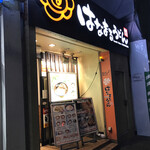
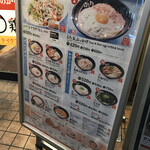
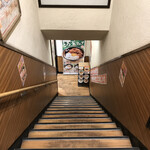
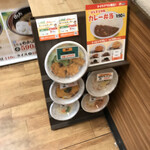
nobu3tokyo
3.00
The taste is just like a regular "hanamaru". However, the hospitality of the staff was excellent. It had been so long that I was a bit unsure of how to place my order, but they listened patiently. Their response made me feel like adding some fried chicken! Since I was quite hungry, it tasted really delicious.

kumori12
3.20
I came here after a long time. Due to COVID-19 measures, each table is surrounded by a semi-transparent frame, making it a pleasant experience for solo diners. The udon noodles are still delicious as always. They also had fried chicken from a specialty store, so I couldn't resist getting that too. It was very filling and satisfying to eat.

uchii250
3.50
There is a signboard for popular fried chicken at Hanamaru Udon, so I visited and ordered the fried chicken called "Torisenn" brand. It was a voluminous dish with a low price, which was very appreciated. Whenever I craved fried chicken before, I used to visit a Skairaku-affiliated restaurant at the Minami exit, but now having a similar level of fried chicken nearby is very helpful.



すーぱー彦左衛門
2.50
I arrived at Hanamaru Udon Nakano-dori store, a 4-minute walk from Nakano Station North Exit in Tokyo, and used a coupon from the app to get a 50 yen discount on the clam udon and fried chicken, bringing the total to 836 yen. This year, Hanamaru started selling clam udon, which piqued my interest. I also heard that you can now enjoy fried chicken from a Yoshinoya Holdings Co. affiliate at Hanamaru, so I decided to check it out. I arrived before 2 p.m. and the restaurant was about half full, with four young female staff members. I ordered the largest piece of fried chicken, received my udon, paid at the register, and then found a seat. The clam udon had about 10 clams, but the broth was different from the usual udon broth, giving it a distinct clam flavor. While it did have seaweed, I felt that green onions would have been a nice addition to the clam udon. The much-anticipated fried chicken was not freshly fried, so the meat was a bit tough, and while it had a strong soy sauce flavor, it didn't stand out as anything special. Overall, I was able to enjoy the consistent quality of Hanamaru once again. Thank you for the meal!
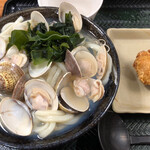
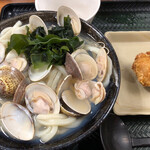
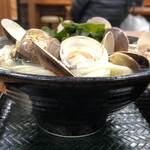
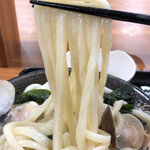
天たま1980
3.30
Tempura udon for 450 yen (udon noodles 320 yen + vegetable tempura 130 yen). Noodles: Soft ←☆☆☆★☆→ Firm. Tempura: Flour-coated ←☆☆☆★☆→ Lots of ingredients. Freshness of tempura: Dry ←☆★☆☆☆→ Freshly fried. Soup: Sweet ←☆☆★☆☆→ Spicy. Personally: Not a fan ←☆☆★☆☆→ Preference. The chewy noodles have a good firmness. The sweet and savory soup pairs well with the noodles. The tempura could have been a bit fresher. The noodles seem to have absorbed the soup quickly, even though it has only been a minute since passing the register. By the time I finished eating, the soup was almost gone. This was at Hanamaru Udon on Nakano Street. It's been a while since I've been to Hanamaru. The prices have gone up a bit compared to before, but the tempura udon is still less than a coin. There are many competing restaurants, but Hanamaru remains a convenient choice.

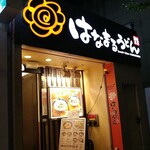
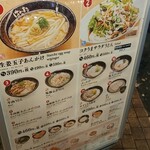
すーぱー彦左衛門
1.50
I used a 50 yen discount coupon on the app and paid 814 yen for beef and egg udon with chikuwa tempura topping at the Hanamaru Udon Nakano-dori store, a 4-minute walk from Nakano Station North Exit in Tokyo. I had thought I wouldn't go to Hanamaru again after a significant price increase four months ago, but they had a menu item that caught my interest. When I arrived at 1 pm, the restaurant was about 30% full. I ordered the chikuwa tempura first and then the udon, and soon received my udon and paid at the counter. Despite using the coupon, it didn't feel like a good deal, probably due to the price increase. When I sat down and looked at the udon, I noticed there was a lot of grated ginger. The beef tasted sweet, similar to the beef bowl at Yoshinoya. I tried to dissolve the ginger in the broth, but the sweetness and ginger clashed, creating a strange taste. Adding chili pepper made it even weirder, so I ended up just eating the noodles and chikuwa. I am usually sensitive to sweetness as I try to avoid sugar, but the sweetness in this dish was overpowering.
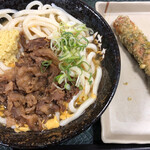
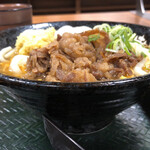
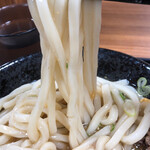
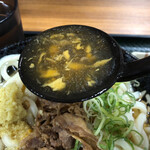
すーぱー彦左衛門
3.00
I visited the Hanamaru Udon Nakano-dori branch, located a 4-minute walk from Nakano Station North Exit in Tokyo. I used a 100 yen discount coupon for tempura toppings and paid 429 yen for my kake udon with chikuwa tempura and toriten. I heard that Hanamaru Udon will be increasing their prices by 70 yen starting from May 26th due to poor business performance. This made me want to try their udon before the price hike. The quality of the udon and tempura was decent, and the freshly fried toriten was particularly tasty. However, with the price increase, the kake udon will cost 352 yen, making it more expensive than regular standing soba shops. On a side note, I noticed about 10 Uber delivery drivers just on my way to and from the restaurant. It seems like they are becoming more common.
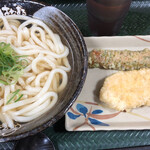
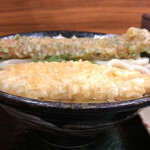
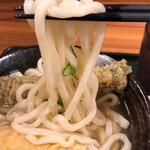
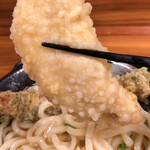
chocho1234
3.10
I had left it as a draft, but on a cold day, I went to eat lunch. There was a PayPay campaign with points back, so I decided to go. I love Sanuki udon, but I especially like kenchin udon because it has a lot of vegetables. Since it was lunchtime, I ordered the large size. It was delicious. I hope they make it a regular menu item. Thank you for the meal.
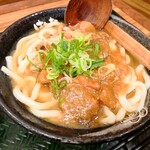
livermore
3.10
The nearest station is Nakano Station. The store is located along Nakano Street, downstairs on the basement floor. There are counter seats and table seats available. I usually prefer cold soba and udon, but with this cold weather, I felt like having some hot udon. I ordered the beef udon (473 yen with a 30 yen discount using a coupon). The beef was seasoned slightly sweet and salty, similar to Yoshinoya's beef quality. The udon and broth were nothing special, but still tasty. It's nice to be able to easily enjoy udon that is decently delicious without any disappointments.
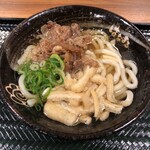
小谷 剛
3.00
I tried the pork miso udon at Hanamaru Udon. The udon was chewy and delicious. The broth was rich and filled with plenty of ingredients, making it a potential classic menu item. However, at 520 yen for a small size, I felt that the price was a bit high. The spicy version of the already sold-out ankake udon received negative feedback. It seems that a simple kake udon for 110 yen is more than enough. There's no other place where you can find such cheap udon. It seems like this is unique to Hanamaru Udon.
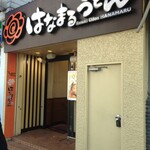
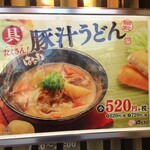

shionl
3.00
I visited a place about a 3-minute walk from Nakano Station North Exit on a weekday night. I ordered a small portion of meat udon and paid in cash. The meat udon was delicious from the first bite to the last, with a rich meat broth that lingered. I like the strong flavor of the thick broth and the taste of the meat. Next time, I want to try the grated spicy cod roe udon that I saw many people ordering in the store. The seating is similar to other restaurants, with mainly counter seats for 1-2 people, and the spacing between seats is sufficient. Customers tend to leave their seats promptly after finishing their meal. Orders are taken while lining up at the entrance. When leaving, customers return the tray to the counter.
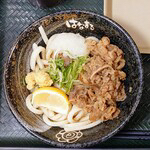
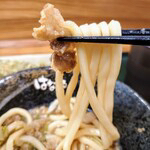
Email Login